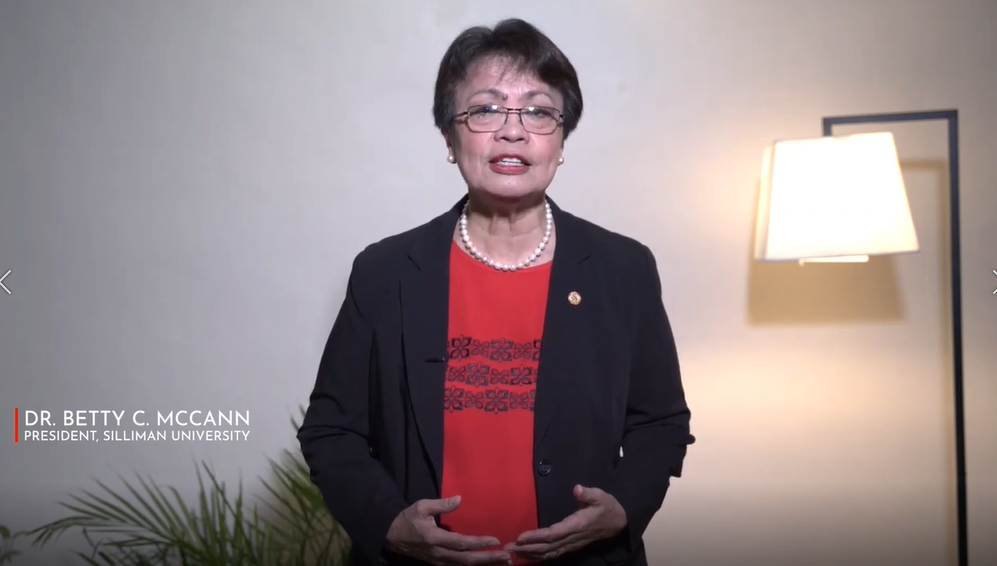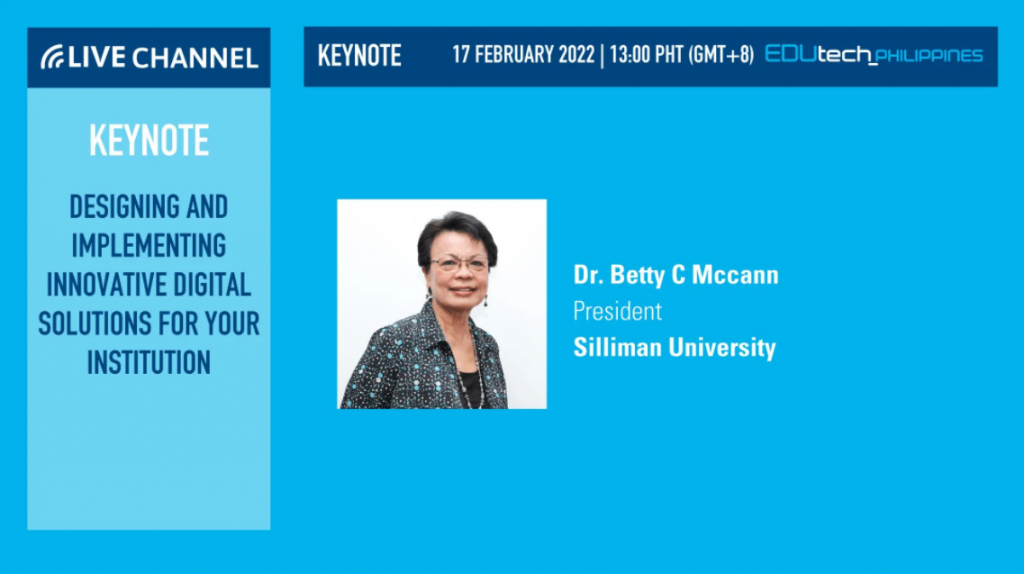
Pres. McCann shares SU’s digital transformation in national confab

Dr. Betty Cernol McCann, Silliman University (SU) president, shared SU’s innovative digital solutions that initiated its digital transformation in a keynote message during the EDUtech Philippines 2022 virtual education festival, February 17.
Supported by the Department of Education (DepEd) and the Technical Education And Skills Development Authority (TESDA), EDUtech Philippines is a two-day event that aimed to gather the education community to learn about and share their best practices on educational technology and pedagogy.
In her message, McCann enumerated SU’s seven initiatives: the SU Apps Incubation and Development Laboratory; the SU Innovation, Creation and Invention (ICI) Laboratory; the SU Technology Business Incubation (TBI) Center; Silliman Online University Learning (SOUL); retooling and upskilling for digital teaching and learning; having a transformative learning space at the SU Library and digital solutions for administrative processes.
McCann said the seven initiatives are SU’s solutions to meet the demands of 21st-century education, which includes increased reliance on digital technologies, while still remaining “true and steadfast” to its vision, mission, goals as a Christian higher education institution.
“Each of the initiatives requires a serious look at our existing programs and determine how these programs respond to the need of the times; an assessment of the readiness of our human resource complement not just in terms of skills building but also as to their level of motivation in being our key players in meeting our strategic development goals; and building on the power of partnerships across academic units, the multidisciplinary and transdisciplinary perspective; among agencies and institutions whom we are networking, as well as among stakeholders like students, alumni, faculty and staff, and administration,” said McCann.
She shared briefly how SU was able to design and implement each initiative.
Nurturing innovation
The SU Apps Incubation and Development Laboratory, established in 2015 as an incubation facility for Apple iOS startup developers and an outsourcing center for Apple iOS development, served as a technology resource center and learning venue for IT students and a training facility for IT Education teachers.
In 2017, SU established the ICI Laboratory named after its donor, Dr. Mariano Lao, 2018 Outstanding Sillimanian awardee, as a training room, service-learning facility, recreation room, and mini-incubation facility.
McCann said the SU-Lao ICI Laboratory continues to organize programs such as creativity camps, to foster innovation among students; competitions; research and capstone grants; and computer education training inclusive of the community outside SU.
Meanwhile, the TBI Center supports innovators and entrepreneurs develop their business ideas by offering support in areas such as development, finding investors, and funding.
Online distance learning
McCann said SOUL, SU’s flagship program for our online distance learning and remote learning, leads the integration of Information, Communication, and Technology (ICT) in SU’s teaching-learning environment in alignment with SU’s mission and goals.
SOUL aims to initiate development of online programs, implement eLearning strategies, and serve as a training facility for technology-based processes in the various avenues for learning.
McCann also emphasized the importance of a continuing skills enhancement plan for faculty and staff, and the “power of partnerships within and beyond the university” in the digital transformation of SU’s programs to ensure that they are responsive to the demands of a “global industry and interactive society.”

Digitized spaces, processes
The SU Library, said McCann, has also undergone a digital transformation incorporating “transformative learning spaces” to provide current and functional technology with reliable connectivity.
Key features of the SU Library will include “state-of-the-art mini labs in science, technology, engineering, medicine, health and social disciplines, and other fields of study,” access to digital resources, and services for the broader community.
McCann said SU also pursued digital solutions for its administrative processes and plans to have a dedicated unit to attend to the ICT needs of the entire university.
Lessons learned
Digital transformation in higher education, said McCann, is inevitable but institutions should be able to transform in ways that are appropriate to their own context.
McCann said important factors in digital transformation are transformational leadership; strategic partnerships that share a common ground; contextualization; new ways of thinking among educators in the age of “disruptive innovation”; and breaking down disciplinal walls to work together and share responsibility in the pursuit of education.
Other keynote speakers for EDUtech Philippines were DepEd Secretary Leonor Magtolis Briones; Bernadette Nacario, Google Philippines country director; Dr. Aristotle C. Dy, SJ, Xavier School president; Michael Ngan, Lenovo Philippines president and general manager; and David B. Bungallon, TESDA-National Institute for Technical Education and Skills Development executive director.
EDUtech Philippines featured more than a hundred education technology experts and educators across the country as speakers on topics related to K-12 and higher education. The event featured presentations, panel discussions, and townhalls to virtually discuss the role of technology in education and included a virtual exhibition hall where of education technologies.


